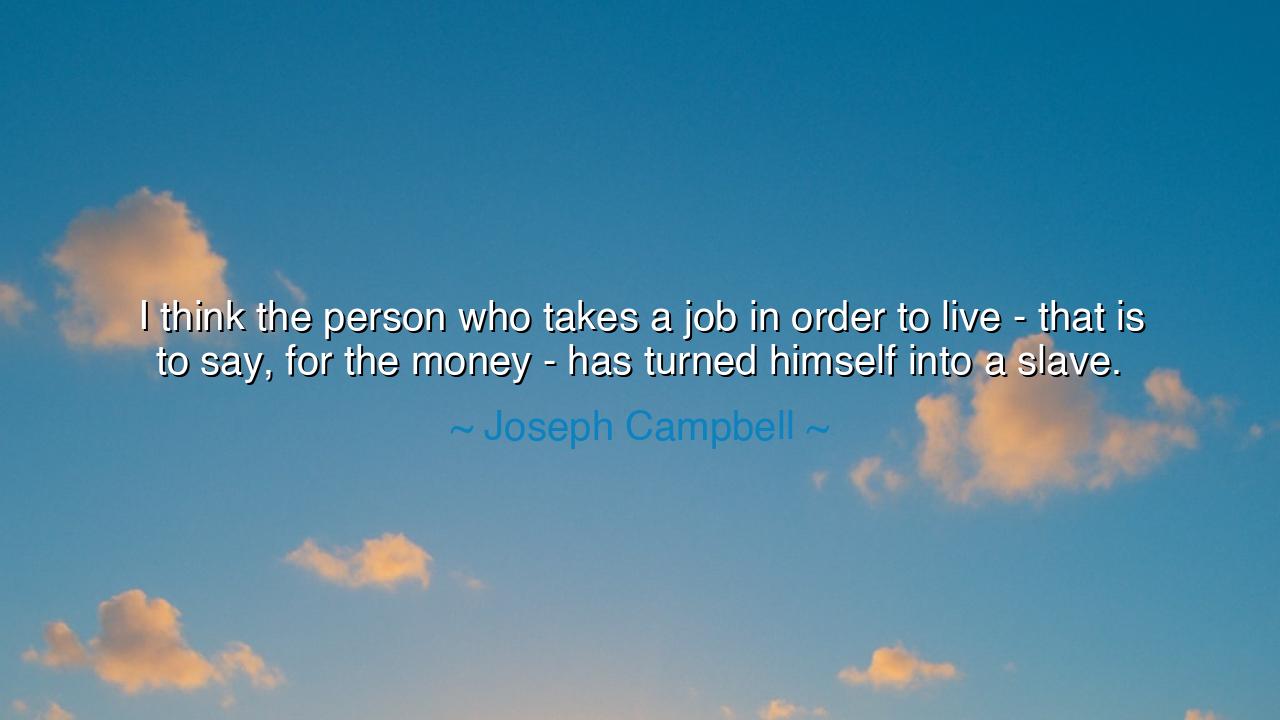
I think the person who takes a job in order to live - that is to
I think the person who takes a job in order to live - that is to say, for the money - has turned himself into a slave.






Hearken, O seekers of freedom and purpose, to the words of Joseph Campbell, the sage of the human spirit: "I think the person who takes a job in order to live—that is to say, for the money—has turned himself into a slave." In this utterance lies the ancient truth that to live solely for gain is to surrender the self, to bow before necessity rather than to walk the path of passion and vocation. The chains of coin bind the soul, and labor divorced from calling becomes the yoke of servitude.
In the theater of existence, many pursue work as mere sustenance, measuring life in gold and coin rather than in fulfillment and contribution. Campbell illuminates that the heart and spirit are stifled when one’s labor is divorced from love and meaning. A life devoted solely to survival is a life unclaimed by the soul; the freedom of self-expression and the pursuit of purpose are sacrificed upon the altar of material gain.
The ancients, who revered the harmony of work and spirit, knew well that slavery of the soul arises not from toil itself, but from the surrender of one’s calling. The artisan, the scholar, the seeker—all who labor from passion, from curiosity, or from devotion, are free, even amidst hardship. It is the alignment of work with inner purpose that grants dignity, energy, and joy, while the pursuit of money alone imposes bondage.
Yet this teaching carries subtle depth: wealth and sustenance are necessary, yet they must be servants, not masters. Campbell’s insight urges the seeker to distinguish between labor as duty and labor as calling, between survival and self-fulfillment. To work for love, curiosity, and meaning is to step into freedom; to work for money alone is to remain tethered, a slave to necessity rather than a master of one’s destiny.
Therefore, O children of courage and discernment, let this teaching lodge within your hearts: seek not merely the coin that fills the purse, but the work that enlivens the soul. In the pursuit of passion and vocation, one discovers liberation, purpose, and the timeless dignity of labor done in alignment with the spirit. The wisdom of Campbell, echoing the ancients, reminds us that true freedom lies not in wealth, but in the courage to claim one’s own path.






NHLuu Nhu Huynh
I can see both sides of this quote. On one hand, working for money might feel like a kind of slavery, especially if we’re doing something we don’t love. But on the other hand, can we afford to be idealistic about work when so many people are just trying to make ends meet? How do we reconcile the need for financial security with the desire for a meaningful, passion-driven career?
SNSam Nhung
I find this quote thought-provoking, especially in today’s world where so many people are driven by financial needs rather than passion. But does working just for the money mean we’ve lost our freedom? Or does it mean that we’re simply trying to survive in a world that’s built on economic pressure? I think it’s a matter of balance—being able to earn a living without losing sight of what truly matters.
PPThanh cong Pham Phan
Joseph Campbell’s perspective really makes me reflect on how we value work in society. So many people are stuck in jobs they dislike just for the money, but is this really a form of enslavement? Perhaps it’s more about a lack of options or opportunities to pursue passions. Can we blame someone for prioritizing financial stability over personal fulfillment, or is there a way to break free from this mindset?
TKNguyen Thien Kim
This quote makes me question the true meaning of work. Is it really a form of slavery if we work solely for money, or is it just a part of the modern reality we live in? Many people have to work to survive, but is it possible to find fulfillment and purpose in a job that’s primarily about financial necessity? I wonder how many of us can truly say we work because we love it, not just for the paycheck.